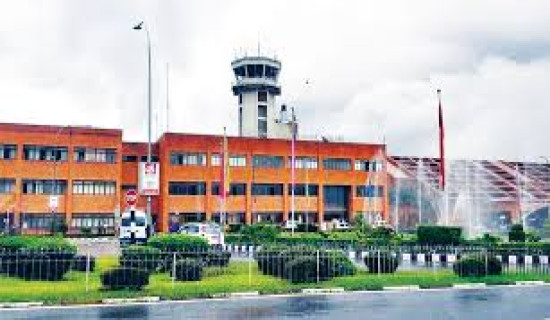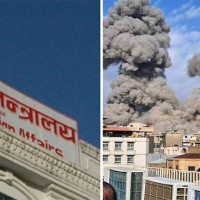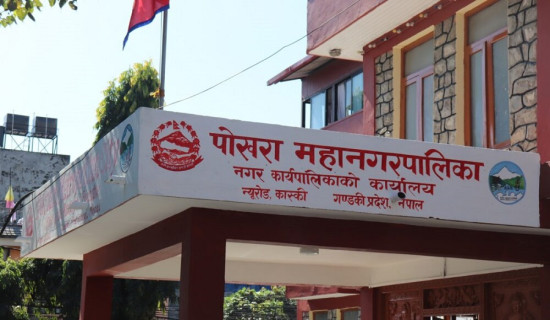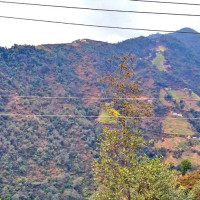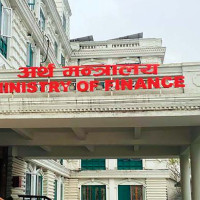- Saturday, 28 February 2026
‘Unscheduled load shedding wreaking havoc on industries’
By Our Correspondent
Biratnagar, Apr. 30: When the price of fuel was Rs. 70-80 per litre, the industrialists of Morang-Sunsari Industrial Corridor used to operate the industry by running generators.
They would call the workers and run the industry while waiting for the electricity to come according the schedule of load shedding at that time.
However, industries in Sunsari-Morang Industrial Corridor are close to shutting down due to unscheduled load shedding.
The price of fuel has increased to Rs. 150 per litre, which is prohibitively expensive.
According to Naveen Rijal, president of the Morang Merchants' Association, the Nepal Electricity Authority (NEA) does not issue a "schedule" on which days, where and how long the load shedding will take place.
Rijal has complained that the industrial sector is being disrupted due to unannounced load shedding.
The industrialists of the East said that it is difficult to know the time of power supply and operation of the industry from morning to evening and from evening to morning.
According to Anil Sharda, the operator of Pioneer Cable and the general secretary of the association, there is a need to cut production and employment due to such a situation.
"We would be relieved to know when the electricity would come and call the workers accordingly.
There are situations when the workers cannot be kept at industries waiting for electricity and so are sent home."
The option of running the industry on fuel is also out of reach for the industrialists.
By purchasing diesel at Rs. 150 per litre and running the generator, the electricity consumption price reaches Rs. 36 per unit.
Earlier, when there was a regular load shedding, the price of fuel was Rs. 70-80 per litre, said another industrialist and senior vice president of Morang Merchants' Association Anupam Rathi.
As there is no way to increase fuel consumption now, the industrialists have not been able to think of any other option but to rely on electricity.
The industrialists have been demanding NEA supply power for the remaining 18 hours by cutting supply for six hours daily.
However, they emphasised that the NEA should inform about the time of load shedding 12 hours before cutting power supply.
Shraban Kumar Agrawal, a member of Federation of Nepalese Chambers of Commerce and Industry, Province 1, complained that production of food, construction materials, packaging, water treatment, soap, biscuits and plastic goods were being wasted due to unscheduled power cuts.
The industrialists are more interested in operating the industries in the corridor from 11 pm to morning.
The NEA has fixed electricity tariff at Rs. 8 per unit from 6 am to 6 pm, Rs. 11 from 6 pm to 11 pm and Rs. 5 per unit from 11 pm to 6 am.
The industrialists of big investments and plants want to run more at a time when tariff is low, said Agrawal.
He said that the electricity required for the industrial sector used to be supplied at this time due to low consumption but that is no longer the case.
The industrialists said that they would accept the formal load shedding in the industrial area from 6 pm to 11 pm during the 'peak hour'. But since then, the NEA should supply electricity to the industries regularly.
With the power outage, the industries operating in the corridor have cut production by 60 per cent and employment by an average of 50 per cent.
Rathi claimed that the workers will remain cut off until the power supply system becomes comfortable.
The industrialists of Biratnagar are also preparing to join the agitation demanding ease of power supply management after the industry came to a standstill due to the power crisis.
The Chamber of Industries Morang along with the Confederation of Nepalese Industries have already started discussions with the NEA regarding their demands.
Rijal informed that if the power supply system of the corridor was not scheduled within the next three days, a strong protest would be launched.
Nepal had demanded 450 MW of electricity from India at the rate of Rs. 12 per unit. However, after receiving only 80 MW, it is not yet clear when load shedding will take place in the industrial sector.
NEA officials said that there is a problem now as the domestic power generation has also declined by 66 per cent.



